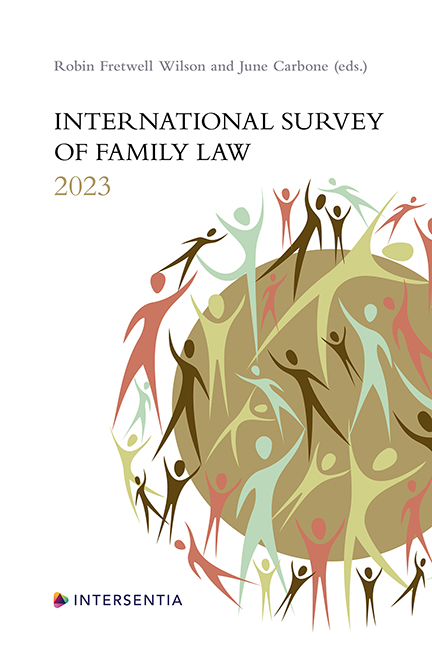Belgium 50 Years of Belgian Parentage Law: Time to Celebrate or Contemplate?
Published online by Cambridge University Press: 03 April 2024
Summary
Résumé
Cet article retrace l’évolution du droit de la filiation en Belgique au cours des 50 dernières années. Sera mis en lumière, le glissement d’une législation fondée sur le mariage vers une législation qui s’appuie également sur des liens biologiques ou sociétaux, qui est ouverte aux couples de femmes et qui fait de l’intérêt supérieur de l’enfant une considération primordiale. Cetteévolution législative, à travers trois importantes réformes (1987, 2006, 2014), est principalement le résultat de jurisprudences de la Cour européenne des droits de l’homme et de la Cour constitutionnelle. Les conséquences de certaines des plus importantes jurisprudences en la mati è re seront donc analysées. La conclusion s’attachera à envisager quelquesévolutions possibles pour l’avenir, par exemple en ce qui concerne un droit de la filiation plus neutre sur le plan du genre.
INTRODUCTION
Belgian parentage legislation has evolved significantly over the past half-century, in response to a series of social as well as scientific changes. Crucial trends, such as the ever-increasing social equality between women and men, the social acceptance of children born out of wedlock, the consecration of the child’s best interests standard, medically assisted reproductive technologies, the opening of marriage to same-sex couples, and the (legal) recognition of transgender persons, have put pressure on Belgian parentage law to evolve in line with these developments. What follows will provide a concise overview of the most important changes that characterise the history of Belgian parentage law, both in terms of the creation and contestation of a parentage bond, and the specific foundations of parentage law.
BEFORE 1987
Before 1987, Belgian family law, enshrined in the Belgian Civil Code, 1 was characterised by an indissoluble connection between marriage, natural procreation and the subsequent establishment of a parentage bond. The law of filiation granted parenthood to two parents: the mother and father, who were married, and had created a biological blood bond with their born child. The nineteenth-century legislator put forward an undeniable connection between sexual intercourse, and the biophysiological bond and genetic bond, as well as the social bond, between the parents and their child. If a child was born within a matrimonial context, the inclusion of the mother’s name on the birth certificate perpetuated a legal parentage bond. Moreover, the Civil Code offered no possibility of contesting parentage on the mother’s side.
- Type
- Chapter
- Information
- International Survey of Family Law 2023 , pp. 101 - 122Publisher: IntersentiaPrint publication year: 2023



